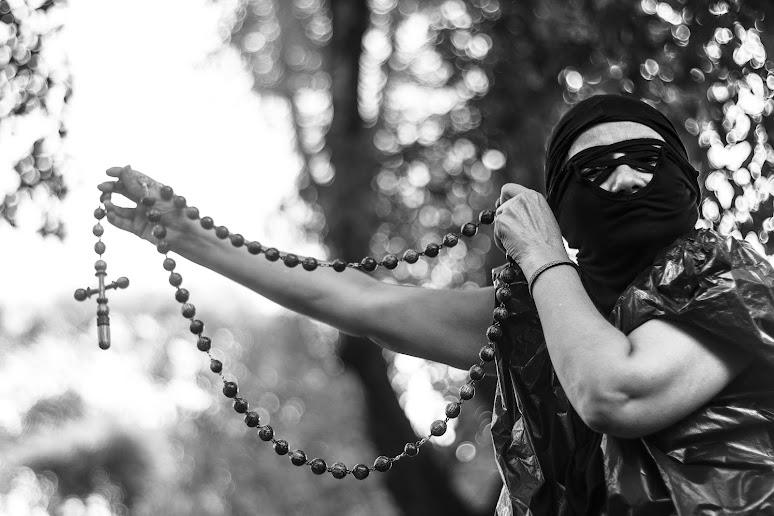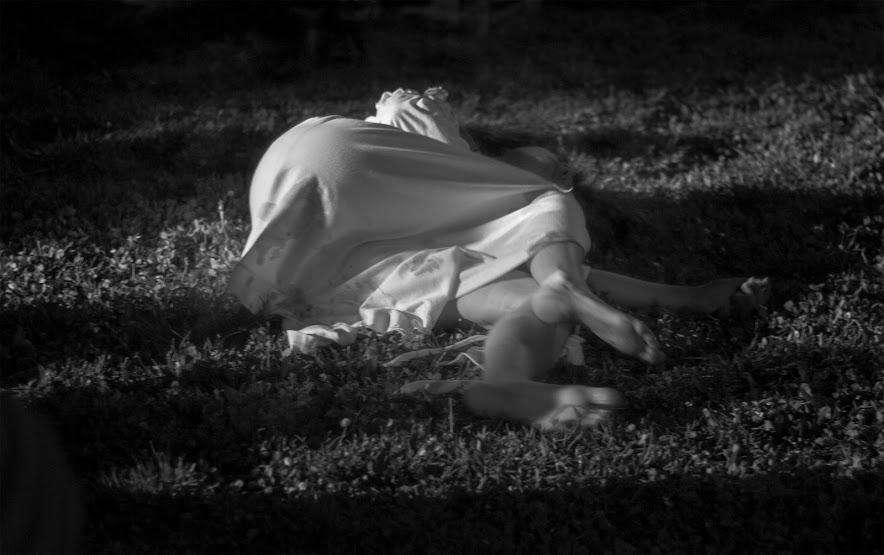Como si Dios se fuera a acordar de mí
 |
| El grito sordo de la religión. Bogotá, 2021 |
“El sacerdote me lo permitió y yo siento que Jesús también fue muy diverso. Para mí la diversidad no es solamente sexual. La diversidad enmarca toda una lluvia de opciones. Hasta si vamos a hablar del conflicto armado. El conflicto armado es diverso, todo es diverso. La palabra marica involucra todo. Es una palabra superpotente. Lo que a mí me dio luz fue querer dejar una huella, un legado. Querer mostrarle al mundo que desde la periferia es que te estoy hablando de mi comuna; desde arriba, desde mi morro. De acá también podemos salir personas excelentes, exitosas. Personas que triunfamos, que no visionamos solo una ciudad, sino un mundo diferente”.[1]
La libertad de religión es un derecho humano inalienable. Ni
la fe ni las creencias deben nunca atraer la violencia. Sin embargo, son muchas
las personas que han sufrido por ese motivo.
Nunca pensé que ir a una iglesia estaría acompañado de comentarios
ofensivos sobre las prácticas de una persona. Los comentarios displicentes eran
el pan nuestro de cada día. El acoso es ilegal, sin embargo, bajo la excusa del
amor me hicieron sentir sucio, pecador, enfermo, anormal, poseído por un demonio.
Yo nunca había pensado en el suicidio, pero en la iglesia
fue tanta la violencia que la idea empezó a rondarme en muchos momentos por la
cabeza. Para completar, en mi casa el mensaje caló como parte de la vida cotidiana
y la violencia fue invadiendo hasta los momentos de descanso. Me controlaban
hasta en el baño, es como si la masturbación fuera lo único que se me pasaba
por la mente. Me controlaban el celular, las llamadas, lo que leía, lo que veía
en la televisión, los amigos, la ropa, hasta la manera de sonreír y de moverme.
Cada vez más me creía que de verdad estaba enfermo, que algo
estaba mal en mí. Pero algo cambió cuando el pastor, el que tanto me violentaba,
aprovechó un momento de soledad y estando de espaldas me tomó entre sus brazos,
besó mi nuca, sentí su erección rosando mis nalgas… quería salir corriendo,
pero pudo más el deseo y me dejé llevar. Él me besó, me acarició; luego
brotaron lágrimas de sus ojos, me pidió perdón y yo quedé más confundido que nunca.
La vida se tormo intermitente, pasábamos de la violencia al
placer, del deseo a la frustración, del rose sutil a la cachetada… del
exorcismo a la bendición.
Decidí huir de allí, cambiar de ciudad, alejarme de mi
familia y por fin encontré el amor, la libertad, la tranquilidad cotidiana. No
puedo negar que eso me tranquilizó. Todo parecía estar bien hasta cuando el
paramilitar que me coqueteaba me buscó para decirme que huyera, que me iban a
matar.
Fue un nuevo desplazamiento, esta vez no voluntario. Me costaba
sentirme víctima del conflicto armado, era otra forma de ser víctima, sentí
miedos similares a los de la experiencia religiosa… fue entonces cuando decidí
desplazarme del todo, no quería volver a contemplar el suicidio. Ya por fin me había
encontrado conmigo mismo como para pensar en borrarme de mi propia existencia y
de la libertad como experiencia cotidiana.
Fotografía (Bogotá, 2021). Obra de Manuel Antonio Velandia
Mora, Ganador de la Beca Idartes de apropiación de Bogotá Diversa dirigida a
los sectores sociales en la categoría víctimas del conflicto armado colombiano.
As if God would remember me.
“The priest
allowed me, and I feel that Jesus was also very diverse. For me, diversity is
not only sexual. Diversity frames a whole rain of options. Even if we are going
to talk about the armed conflict. The armed conflict is diverse, everything is
diverse. The word faggot involves everything. It's a super powerful word. What
gave me light was wanting to leave a mark, a legacy. Wanting to show the world
that from the periphery I am talking to you about my commune; from above, from
my nose. Excellent, successful people can also come out of here. People who
succeed, who do not envision just a city, but a different world.”
I never
thought that going to a church would be accompanied by offensive comments about
a person's practices. Dismissive comments were our daily bread. Harassment is
illegal, however, under the excuse of love they made me feel dirty, sinful,
sick, abnormal, possessed by a demon.
I had never
thought about suicide, but in the church, there was so much violence that the
idea began to cross my mind at many times. To complete, in my house the message
permeated as part of daily life and the violence invaded even the moments of
rest. They controlled me even in the bathroom, it's as if masturbation was the
only thing that crossed my mind. They controlled my cell phone, my calls, what
I read, what I watched on television, my friends, my clothes, even the way I
smiled and moved.
More and
more I believed that I was sick, that something was wrong with me. But
something changed when the pastor, the one who violated me so much, took
advantage of a moment of solitude and while my back was turned, he took me in
his arms, kissed the back of my neck, I felt his erection touching my
buttocks... I wanted to run away, but desire got the better of me and I I let
go He kissed me, caressed me; Then tears flowed from his eyes, he asked me for forgiveness,
and I was more confused than ever.
Life became
intermittent, we went from violence to pleasure, from desire to frustration,
from subtle rose to slap... from exorcism to blessing.
I decided
to flee from there, change cities, get away from my family and finally found
love, freedom, everyday tranquility. I can't deny that that calmed me down.
Everything seemed fine until the paramilitary who was flirting with me looked
for me to tell me to run away, that they were going to kill me.
It was a
new displacement, this time not voluntary. It was difficult for me to feel like
a victim of the armed conflict, it was another way of being a victim, I felt
fears like those of the religious experience... that was when I decided to move
away completely, I did not want to contemplate suicide again. I had finally
found myself enough to think about erasing myself from my own existence and
from freedom as a daily experience.
Photography
(Bogotá, 2021). Work by Manuel Antonio Velandia Mora, Winner of the Idartes
Scholarship for the appropriation of Bogotá Diverse aimed at social sectors in
the category of victims of the Colombian armed conflict.
[1] Volumen
Testimonial del Informe Final de la Comisión de la Verdad, 28 de junio del 2022.
Cuando los pájaros no cantaban: historias del conflicto armado en Colombia.
[2] Testimonial Volume of the Final Report of the Truth Commission, June 28, 2022. When the birds did not sing: stories of the armed conflict in Colombia.



Comentarios
Publicar un comentario